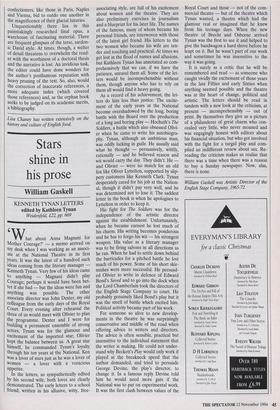Stars shine in his prose
William Gaskell
KENNETH TYNAN LEI I ERS edited by Kathleen Tynan Weidenfeld, f22, pp. 669 hat about Anna Magnani for Mother Courage?' — a memo arrived on my desk when I was working as an associ- ate at the National Theatre in its first years. It was the latest of a hundred such ideas coming from the literary manager Kenneth Tynan. Very few of his ideas came to anything — Magnani didn't play Courage; perhaps it would have been bet- ter if she had — but the ideas were fun and anything was possible. The other associate director was John Dexter, my old colleague from the early days of the Royal Court. Every evening after rehearsal the three of us would meet with Olivier to plan the programme. Dexter and I were for building a permanent ensemble of strong actors; Tynan was for the glamour and excitement of the imported star; Olivier kept the balance between us. A great star himself, he commanded Tynan's loyalty through his ten years at the National. Ken was a lover of stars just as he was a lover of women — a lover with a voracious appetite.
In the letters, so sympathetically edited by his second wife, both loves are clearly demonstrated. The early letters to a school friend, written in his allusive, witty, free- associating style, are full of his excitement about women and the theatre. They are also preliminary exercises in journalism and a blueprint for his later life. The names of the famous, many of whom became his personal friends, are interwoven with those of the latest girl friend. His letters to the two women who became his wife are ten- der and touching and practical. At times we get lost in the flood of names and allusions, but Kathleen Tynan has annotated so com- prehensively that we can, if we have the patience, unravel them all. Some of the let- ters would be incomprehensible without them, though anyone who has to rely on them all would find it heavy going.
As a record of his achievement, the let- ters do him less than justice. The excite- ment of the early years at the National become overshadowed by the long, boring battle with the Board over the production of a long and boring play — Hochuth's The Soldiers, a battle which also obsessed Olivi- er when he came to write his autobiogra- phy. Tynan, although an ambitious man, was oddly lacking in guile. He usually said what he thought — persuasively, wittily, rationally — and he believed reason and wit would carry the day. They didn't. He and Olivier — were no match for an old fox like Oliver Lyttelton, supported by slip- pery customers like Kenneth Clark. Tynan desperately cared for his job at the Nation- al, though it didn't pay very well, and he was determined not to lose it. The saddest letter in the book is when he apologises to Lyttelton in order to keep it. His fight for The Soldiers was for the independence of the artistic director against the establishment. Unfortunately, when he became earnest he lost much of his charm. His writing becomes ponderous and he has to forgo his wit — his strongest weapon. His value as a literary manager was to be firing salvoes in all directions as he ran. When he had to settle down behind the barricades for a pitched battle he lost much of his power. Some of his short skir- mishes were more successful. He persuad- ed Olivier to write in defence of Edward Bond's Saved and to go into the dock when the Lord Chamberlain took the directors of the English Stage Company to court. He probably genuinely liked Bond's play but it was the smell of battle which excited him. Political activity became part of his work.
For someone so alive to new develop- ments in the theatre he was surprisingly conservative and middle of the road when offering advice to writers and directors. The advice is often sensible, practical but insensitive to the individual statement that the writer is making. He could not under- stand why Beckett's Play would only work if played at the breakneck speed that the author demanded, and tried to persuade George Devine, the play's director, to change it. In a famous reply Devine told him he would need more guts if the National was to put on experimental work. It was the first clash between values of the Royal Court and those — not of the com- mercial theatre — but of the theatre which Tynan wanted, a theatre which had the glamour real or imagined that he knew from his teenage days. When the new theatre of Brecht and Osborne arrived Tynan was the first to see it and helped to give the bandwagon a hard shove before he leapt on it. But he wasn't part of our work and sometimes he was insensitive to the way it was going.
It is surely as a critic that he will be remembered and read — as someone who caught vividly the excitement of those years in the late Fifties and early Sixties when anything seemed possible and the theatre was at the heart of change, political and artistic. The letters should be read in tandem with a new look at the criticism, at present — incomprehensibly — out of print. By themselves they give us a picture of a philanderer of great charm who con- cealed very little, who never moaned and was engagingly honest with editors about his financial situation, but who got involved with the fight for a turgid play and com- piled an indifferent review about sex. Re- reading the criticism makes us realise that there was a time when there was a reason to buy a Sunday newspaper. Now, alas, there is none.
William Gaskell was Artistic Director of the English Stage Company, 1965-72.


































































 Previous page
Previous page